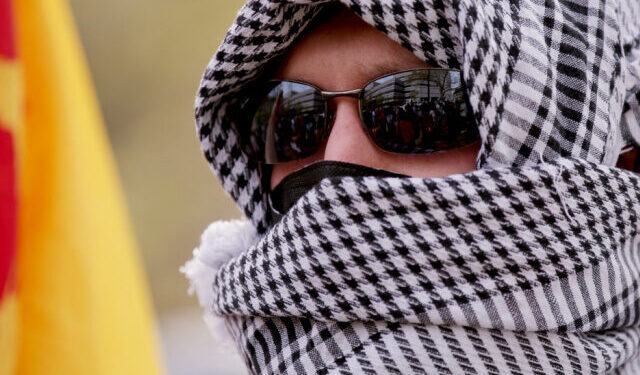On Wednesday, Columbia University’s iconic Butler Library became the epicenter of escalating tensions as pro-Palestinian protesters stormed the building, leading to a significant police response and multiple arrests.
The demonstration, organized by the Columbia University Apartheid Divest (CUAD) movement, aimed to highlight the university’s alleged complicity in “imperialist violence.” Protesters, many donning masks and kaffiyehs, pushed through security barriers, entered the library, and occupied the main reading room. They played drums and displayed signs demanding the release of Mahmoud Khalil, a recent Columbia graduate detained by ICE.
As the situation escalated, Columbia’s public safety officers intervened, requesting identification from the demonstrators. Those who refused were warned of potential arrest. Despite these warnings, many protesters remained, leading the university to call in the NYPD. Approximately 80 individuals were taken into custody, with some reporting injuries during the altercations.
In a statement, Columbia University condemned the disruption, emphasizing the importance of maintaining an environment conducive to academic pursuits, especially during final exams. The university indicated that participating students might face disciplinary actions.
The protest and subsequent arrests have reignited debates about campus activism and university accountability. Representative Elise Stefanik (R-NY) criticized Columbia’s handling of the situation, stating on X, “While Columbia students try to study for finals, they’re being bombarded with chants for a ‘global intifada.’ President @realDonaldTrump is right: not a single taxpayer dollar should go to a university that allows chaos, antisemitism, and civil rights violations on its campus. Columbia must act — enough is enough.”
This incident follows the Trump administration’s decision in March 2025 to revoke approximately $400 million in federal grants to Columbia University. The administration cited the university’s alleged failure to address antisemitic harassment on campus as the primary reason for the funding cuts. In response, Columbia laid off nearly 180 staff members and implemented measures such as banning face coverings during protests and enhancing campus security.
Columbia’s challenges are part of a larger national conversation about the role of universities in addressing antisemitism and managing campus protests. The Trump administration has initiated reviews of multiple institutions, including the University of Washington, following similar pro-Palestinian demonstrations.
As the debate continues, universities across the country are grappling with the balance between upholding free speech and ensuring campus safety. Columbia’s recent experiences underscore the complexities institutions face in navigating these contentious issues.




















